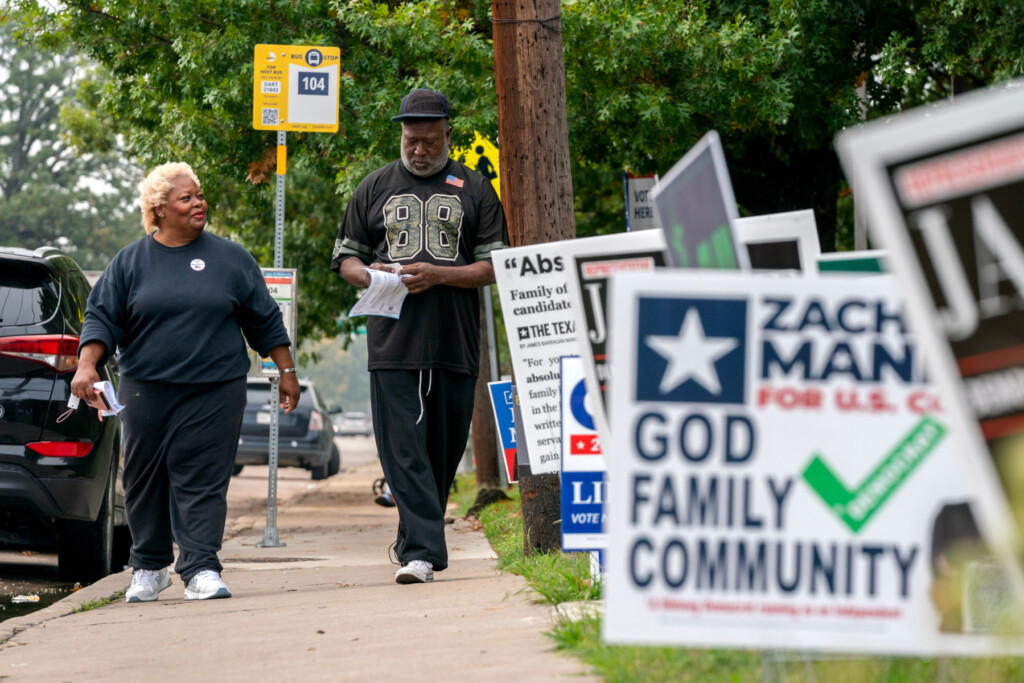A big red wave was more like a trickle across the country on Tuesday, but in Texas, the margins of victory for statewide Republican candidates were much larger than anticipated.
Winning a statewide race was always going to be difficult for the Democrats—the party hasn’t won one since 1994. However, aside from Dallas County and other urban counties, the GOP clawed back some of the ground it lost to suburban areas like Collin, Denton, and Tarrant counties. Those wins weren’t the same margins the party enjoyed prior to the Trump presidency, however. For instance, in Collin County, Republicans could reliably count on at least a 30-point margin of victory until 2016. On Tuesday, Gov. Greg Abbott won by 10 points. He won by just 4 points in Tarrant County.
In a memo obtained by the Texas Tribune, Jamarr Brown, the executive director of the Texas Democrats, outlined the gains the party made and what impeded the party’s progress in this election. He also addressed the frustrating losses on the statewide level, saying that “a loss is still a loss…and it’s frustrating not to be able to see the fruits of our labors more immediately.
“But massive political change in a state as big as Texas can only be made incrementally,” he continued, acknowledging that “it’s exasperating to hear.”
Matt Rinaldi, chairman of the Texas GOP, broke his impressions of the election down in a Twitter thread Wednesday. One takeaway? “But the lesson is, the GOP can’t rest on Dem incompetence & 70% of voters believing America is on the wrong track to win elections. It needs a positive message and governing agenda. It needs to stand for something,” he said.
For local and statewide perspectives, we talked to Democratic strategist Jay Pritchard and campaign finance expert Chris Tackett—who you can also catch in the CNN documentary “Deep in the Pockets of Texas“—about the election.
We’ve had (a little) time to sleep on these results. General impressions?
CT: On the statewides, it was the most likely and expected outcome. Dems haven’t won statewide in decades, so this was just a continuation of the trend.
JP: I blame the Democratic party for not having a coordinated and consistent message on bipartisan issues like property taxes, school funding, and the economy. The Republicans had many weaknesses on college affordability, teachers leaving our schools, no right to privacy (women’s healthcare, child investigations), and gas and electric prices resulting from a failed power grid that were not exploited.
Texas overall—extremely disappointed in the turnout. I don’t care if you are an R or a D; to have less than a 45 percent turnout in Dallas County is embarrassing. Texas statewide—absolute failure. I actually think Beto on the top of the ballot hurt. Outside of his rallies, there was no enthusiasm.
State house/state senate are completely predictable after redistricting. There were very few competitive races.
Dallas County stayed reliably blue, and statewide races remained red. Were there any real surprises in this election?
CT: Honestly, the surprise is that it wasn’t closer in some of the statewides.
JP: On the statewide side, the margin of victory by all the Republican candidates was astounding. With the margins in rural Texas heavily favoring Republicans, the Democrats’ failure to run up the score in urban counties prevented them from even making the races close.
There was a lot of talk about whether polling was reliable. What’s the verdict on that?
CT: Reliable polls were reliable. In the Texas Politics Project poll released on October 21, it put the Governor’s race at 54 percent to 43 percent. That’s pretty spot-on for where things landed. There are lots of groups doing lots of polls. Find the ones who have a history of quality polls and follow them.
JP: Most of the polling was correct on the Republican vs. Democrat races, but the margins of victory for statewide Republicans were much greater than they predicted.
I’m getting asked a lot about how the O’Rourke campaign lost this when he was commanding such big attendance wherever he went. Should we explain perception vs. reality? What happened there?
CT: Lots of people showed up at rallies. And most likely, a vast majority of those who attended showed up to vote, but when turnout is 8 million people, that’s a whole lot more than just rally crowds. But there are so many others, especially in the 18-29 age group, and this applies to all ages, who don’t necessarily clue into politics, who don’t feel like their vote or voice matters. That’s who didn’t show up.
JP: The Beto team knows how to run an efficient, high-energy campaign. But, unfortunately, his failed presidential run in 2020 doomed him. He was labeled as a far-left Democrat, and there was just no coming back from his comment about guns.
Why didn’t things like the response to the Uvalde shooting and the grid failure move the needle for more voters?
CT: I honestly think it is a recency bias. If those things would have happened closer to the election, they may not have created a different outcome, but the numbers would have likely played a lot closer.
JP: I have no idea. My only guess is that the national political situation is so polarized that elections have become tribal warfare, and you stick with your party no matter what.
Someone said Tuesday that we don’t have a voter registration problem, we have a voter turnout problem. Another person asked if some voters — especially moderates—were “polarized to the point of paralysis.” In an election where the narrative was that there was a lot at stake, why do you think we didn’t see more registered voters casting ballots in Texas?
CT: What we saw last night was: 1) Tribe trumps everything else, and 2) Broad apathy. There was a broad appeal made into rural spaces and across the aisle to try and get Republicans who may be frustrated with their party to cross over in large numbers and vote for Democrats. Even if individuals didn’t agree with a policy or a decision made by a member of Republican leadership, there is nothing I’ve seen that would imply we saw those crossovers happen, meaning when people got into the voting booth, they swallowed their reservations and voted for the letter next to someone’s name. That’s part 1. Part 2 is the apathy. If you don’t believe you can actually make a difference, that both sides are corrupt, that it’s already in the bag for one side or the other, showing up to cast the ballot becomes very unlikely. And that’s exactly the core propaganda that’s been put forth since 1980 with Paul Weyrich and his “goo goo government” speech. Keeping turnout low is actively part of the plan for one side. The other side (Democrats) has to figure out how to connect with voters and get them motivated. They haven’t unlocked it yet.
JP: The turnout is my biggest problem with this election. I was on many coordinated campaign calls with different groups. There was a great overemphasis on registering people to vote versus getting persuasive messages out to people with a proven track record of voting. Of course, voter registration is essential, but that work needs to be done in the “off” years. Unfortunately, the amount of money and energy spent on voter registration by Democrats this summer and fall took the focus off of actually turning out voters, as evidenced by the lack of turnout.
Municipal elections will be next. Do you think we’ll see any of these local candidates who didn’t win take a stab at a city council or school board seat?
CT: That’s the path we saw last cycle with candidates like Elizabeth Beck pivoting to a successful run for Fort Worth City Council. I’d certainly expect to see some of the candidates this go around follow the same path.
JP: The May election will be competitive up and down the municipal ballot. Dustin Marshall’s open Dallas ISD trustee seat, in particular, will be hotly contested. Although the voter mix in the May elections differs from those in November, I’d be particularly worried if I had an R by my name and lost on Tuesday.
Get the D Brief Newsletter
Author





